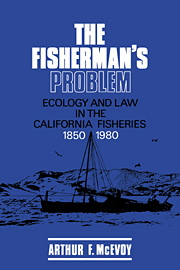Book contents
Preface
Published online by Cambridge University Press: 06 January 2010
Summary
This book is a history of the living communities – plant, animal, and human – that have cohabited the rivers and offshore waters of California. It is not an altogether happy story. It features prominently the wanton destruction of some of the most valuable fisheries in the world and the immense human losses that attended it. It is a history of bitter and sometimes violent conflict among the many and diverse groups that have built livelihoods on the region's fisheries. It chronicles the repeated failure of public agencies to take effective action against the depletion of resources that, given a modicum of care, might have remained productive indefinitely. The story has value, nonetheless, for the picture it offers of the remarkable ways in which ecology, economic enterprise, and legal processes interacted to shape the course of change in an important extractive industry. The interaction among the three is the key concern of this book. Like the pieces of a watch, the elements of the story evince their full significance only in working relationship to each other.
My interest in the fisheries began during my years in graduate school at the University of California at San Diego, when for a seminar led by Professor Earl Pomeroy I studied a local community of Chinese immigrants who by chance happened to be abalone hunters. I was struck by the way in which non-Chinese fishers used what ostensibly were conservationist concerns, that is, that the immigrants' fishing methods depleted stocks on which others depended, for what clearly was the racist purpose of driving the Chinese themselves out of business by any means necessary.
Information
- Type
- Chapter
- Information
- The Fisherman's ProblemEcology and Law in the California Fisheries, 1850–1980, pp. xi - xiiPublisher: Cambridge University PressPrint publication year: 1986
